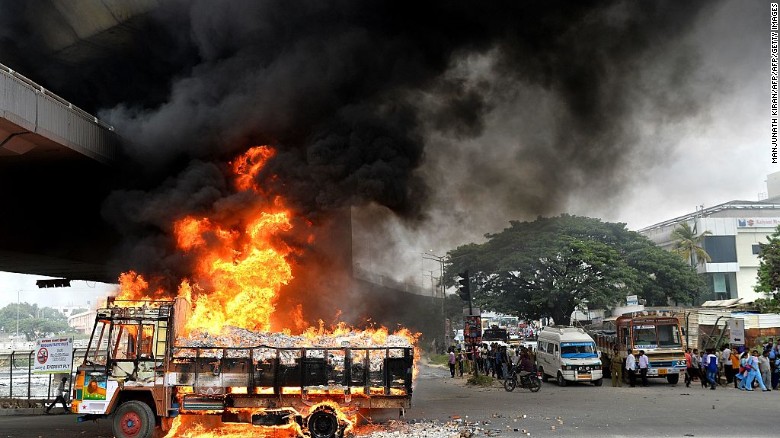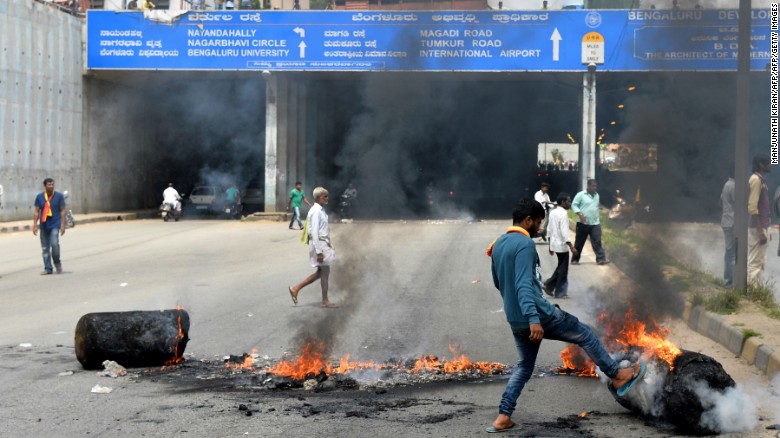New Delhi – Two people have died in ongoing disputes over water in India’s Silicon Valley.
A demonstrator was shot dead by police who opened fire amid violent protests, while another died from their injuries Monday night.
State ministers held emergency meetings Tuesday after demonstrators vandalized shops and set fire to more than 100 cars, buses and trucks in Bangalore, Karnataka, after days of tension following a Supreme Court order to release water from the state’s reservoirs to neighboring state Tamil Nadu.
One protester died and two others were injured after police opened fire to disperse the crowd, KSR Charan Reddy, a senior police official, told CNN.
Karnataka’s Chief Minister S Siddaramaiah said in a press conference Tuesday that one person died in hospital due to injuries sustained during Monday’s clashes. Siddaramaiah added that the individual died from injuries resulting from a fall while fleeing police over any police beatings or bullets.
Thousands of police have been deployed in the city in an attempt to regain control, while authorities have banned large gatherings and imposed a curfew in several areas.
“Injustice has been done to us, but I request all to protest peacefully,” Karnataka’s home minister G Parameshwara appealed to protestors in a press conference on Monday.
“Until now we have detained nearly 200 people involved in the violent protests,” the state home minister said.
In a statement, Indian Prime Minister Narendra Modi said he was “personally pained at the developments.”
“Violence cannot provide a solution to any problem. In a democracy, solutions are found through restraint and mutual dialogue,” Modi said.

Karnataka’s Chief Minister S Siddaramaiah said in a press conference Tuesday that one person died in hospital due to injuries sustained during Monday’s clashes. Siddaramaiah added that the individual died from injuries resulting from a fall while fleeing police over any police beatings or bullets.
Thousands of police have been deployed in the city in an attempt to regain control, while authorities have banned large gatherings and imposed a curfew in several areas.
“Injustice has been done to us, but I request all to protest peacefully,” Karnataka’s home minister G Parameshwara appealed to protestors in a press conference on Monday.
“Until now we have detained nearly 200 people involved in the violent protests,” the state home minister said.
In a statement, Indian Prime Minister Narendra Modi said he was “personally pained at the developments.”
“Violence cannot provide a solution to any problem. In a democracy, solutions are found through restraint and mutual dialogue,” Modi said.
Protests after court ruling
Tempers have been running high on Karnataka’s streets since a September 5 Supreme Court ruling which ordered the state to release 15,000 cubic feet of water per second per day (cusecs) from its reservoirs to relieve drought-stricken farmers in Tamil Nadu.
After rumblings of unrest, the court on Monday reduced the level to 12,000 cubic feet of water per second each day until September 30.
Riots erupts after the court refused Karnataka’s request for a further reduction.
“We are ready to give up our lives but not Cauvery,” one protestor screamed, referring to the river that supplies the water to the reservoirs.
“Cauvery belongs to Karnataka,” the crowd shouted.

Dispute over the Cauvery River
The Cauvery River originates in Karnataka and flows into Tamil Nadu before eventually feeding into the Bay of Bengal.
Millions of farmers in both states rely on Cauvery waters for irrigation. As the monsoon rains wind down in southern India in September, sources of drinking water run short.
Farmers also struggle to meet their farming needs. Tamil Nadu claims it is not receiving enough water and blames Karnataka for holding it in its reservoirs. The latter claims the former is asking for more than it actually needs.
The dispute over Cauvery’s waters go back to early 1800, according to government records. The century old disagreement has had resulted in multiple settlements in the past, but none has resolved the issue.
In its ruling, the Supreme Court said citizens “cannot become a law unto themselves. When a court of law passes an order, it is the sacred duty of the citizens to obey the same.”
The United States issued a travel advisory Monday asking Americans to avoid the tense areas in Karnataka, including Bangalore.
“You should avoid areas of demonstrations, and exercise caution if in the vicinity of any large gatherings, protests, or demonstrations,” the advisory states.
Bangalore is India’s original tech hub, home to campuses of many Indian and US tech giants, including Infosys, Microsoft and Google.
As reported by CNN
